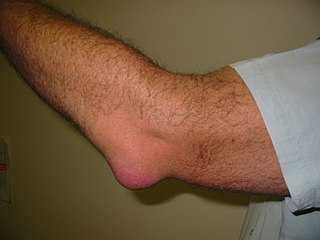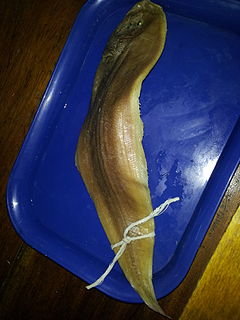Irish most commonly refers to:
The nanometre or nanometer is a unit of length in the metric system, equal to one billionth of a metre. The name combines the SI prefix nano- with the parent unit name metre. It can be written in scientific notation as 1×10−9 m, in engineering notation as 1 E−9 m, and as simply 1/1000000000 metres. One nanometre equals ten ångströms. When used as a prefix for something other than a unit of measure, nano refers to nanotechnology, or phenomena typically occurring on a scale of nanometres.
FYI is a common abbreviation of "For Your Information".

Ibid is an abbreviation for the Latin word ibīdem, meaning "in the same place", commonly used in an endnote, footnote, bibliography citation, or scholarly reference to refer to the source cited in the preceding note or list item. This is similar to īdem, literally meaning "the same", abbreviated Id., which is commonly used in legal citation.
The 24-hour clock is the convention of time keeping in which the day runs from midnight to midnight and is divided into 24 hours, indicated by the hours passed since midnight, from 0 to 23. This system is the most commonly used time notation in the world today, and is used by international standard ISO 8601.

Magnesium sulfate is an inorganic salt with the formula MgSO4(H2O)x where 0≤x≤7. It is often encountered as the heptahydrate sulfate mineral epsomite (MgSO4·7H2O), commonly called Epsom salt. The overall global annual usage in the mid-1970s of the monohydrate was 2.3 million tons, of which the majority was used in agriculture.

In law, the bar is the legal profession as an institution. The term is a metonym for the line that separates the parts of a courtroom reserved for spectators and those reserved for participants in a trial such as lawyers.

Sexual penetration is the insertion of a body part or other object into a body orifice, such as the vagina, anus or mouth, as part of human sexual activity or animal sexual behavior.
A mid vowel is any in a class of vowel sounds used in some spoken languages. The defining characteristic of a mid vowel is that the tongue is positioned midway between an open vowel and a close vowel.
A central vowel, formerly also known as a mixed vowel, is any in a class of vowel sound used in some spoken languages. The defining characteristic of a central vowel is that the tongue is positioned halfway between a front vowel and a back vowel.
The at sign, @, is normally read aloud as "at"; it is also commonly called the at symbol or commercial at. It is used as an accounting and invoice abbreviation meaning "at a rate of", but it is now most commonly used in email addresses and social media platform "handles". The term "alphasand" is sometimes used to refer to "@", especially in East Asia.

Bursitis is the inflammation of one or more bursae of synovial fluid in the body. They are lined with a synovial membrane that secretes a lubricating synovial fluid. There are more than 150 bursae in the human body. The bursae rest at the points where internal functionaries, such as muscles and tendons, slide across bone. Healthy bursae create a smooth, almost frictionless functional gliding surface making normal movement painless. When bursitis occurs, however, movement relying on the inflamed bursa becomes difficult and painful. Moreover, movement of tendons and muscles over the inflamed bursa aggravates its inflammation, perpetuating the problem. Muscle can also be stiffened.
A world championship is generally an international competition open to elite competitors from around the world, representing their nations, and winning such an event will be considered the highest or near highest achievement in the sport, game, or ability.

Scorpio is the eighth astrological sign in the Zodiac, originating from the constellation of Scorpius. It spans 210°–240° ecliptic longitude. Under the tropical zodiac, the Sun transits this area on average from October 23 to November 22. Under the sidereal zodiac, the Sun is in Scorpio from approximately November 16 to December 15. Depending on which zodiac system one uses, an individual born under the influence of Scorpio may be called a Scorpio or a Scorpion.

Coping or scribing is the woodworking technique of shaping the end of a moulding or frame component to neatly fit the contours of an abutting member. Joining tubular members in metalworking is also referred to as a cope, or sometimes a "fish mouth joint" or saddle joint.

Turkish Statistical Institute is the Turkish government agency commissioned with producing official statistics on Turkey, its population, resources, economy, society, and culture. It was founded in 1926 and has its headquarters in Ankara.

Nigerians or the Nigerian people are citizens of Nigeria or people with ancestry from Nigeria. Nigeria is composed of multiple ethnic groups and cultures and the term Nigerian refers to a citizenship-based civic nationality. Nigerians derive from over 250 ethnic groups and languages. Though there are multiple ethnic groups in Nigeria, economic factors result in significant mobility of Nigerians of multiple ethnic and religious backgrounds to reside in territories in Nigeria that are outside their ethnic or religious background, resulting in the intermixing of the various ethnic and religious groups, especially in Nigeria's cities. The English language is the lingua franca of Nigerians. About 50 percent of Nigerians are Christians and the other 50 percent are Muslims.

The Minister of Defence is the head of the Ministry of Defence of the Government of India. They are often assisted by a Minister of State for Defence and less-commonly, the lower-ranked Deputy Minister of Defence. The defence minister additionally serves as President of the Institute for Defence Studies and Analyses, and as Chancellor of the Defence Institute of Advanced Technology and of the National Defence University.












